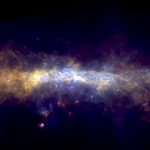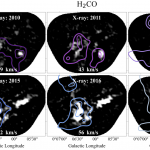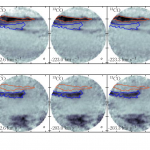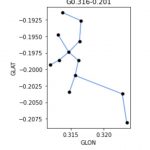 The 3D CMZ project builds a top-down view of our Galaxy's Center.
The 3D CMZ project builds a top-down view of our Galaxy's Center. The Milky Way Lab Research Team in Spring 2025
The Milky Way Lab Research Team in Spring 2025 The MW Lab leads high-resolution observational surveys of our Galaxy's Center.
The MW Lab leads high-resolution observational surveys of our Galaxy's Center. The Milky Way Lab Research Team in Spring 2024
The Milky Way Lab Research Team in Spring 2024 The Central Molecular Zone is a weird, and wild place. Home to extreme star formation and the mysteries of how and when supermassive black holes feed.
The Central Molecular Zone is a weird, and wild place. Home to extreme star formation and the mysteries of how and when supermassive black holes feed. We are using X-ray echoes to map molecular clouds in the Galactic Center.
We are using X-ray echoes to map molecular clouds in the Galactic Center.
Contact Information
Email: cara.battersby@uconn.edu
Office: Gant South S-113F
Virtual Office: https://uconn-cmr.webex.com/meet/cab16109
Phone: (860 ) 486-3988
Address: Department of Physics
196A Auditorium Rd, Unit 3046
Storrs, CT 06269-3046
The Milky Way Laboratory is a research group at the University of Connecticut that specializes in using our home Galaxy as a laboratory for understanding star formation throughout the cosmos. Read about our research, meet the team, and see where we are featured in the media. For a broad-level public overview of our work, check out our latest news items!
We are an open source research group. The Milky Way Lab freely shares our code: Milky Way Laboratory on GitHub and have many repositories on the Central Molecular Zone Github. Our recent 3D CMZ project has its own dedicated 3D CMZ website with paper links, code, data, a worldwide telescope tour, and a cool 3D viewer. Our CMZoom data is publicly available at the CMZoom Dataverse.
The Milky Way Laboratory was founded by Prof. / Dr. Cara Battersby, who is an associate professor of physics at the University of Connecticut, specializing in observational astrophysics. Prof. Battersby studies how stars are born in our Galaxy’s Central Molecular Zone (CMZ) by combining large observational surveys and numerical simulations. Prof. Battersby has authored over 100 publications and given over 70 invited research presentations. Read more about her research, team, and accolades. She is not very media-social, but you can sometimes find her on bluesky.

 Recent Publications
Recent Publications
- Rhea-RT: Dynamical impact of Central Molecular Zone conditions on ISM properties and stellar feedback coupling December 10, 2025The Central Molecular Zone (CMZ) is an extreme star formation environment, characterized by higher density, higher turbulence, stronger orbital shear, and stronger magnetic field strength than the Solar neighborhood. Whether classical theories of star formation hold within this extreme environment is still debated. In order to assess the impact of these different conditions on the […]R. G. Tress
- ALMAGAL VI. The spatial distribution of dense cores during the evolution of cluster-forming massive clump December 5, 2025High-mass stars and star clusters form from the fragmentation of massive dense clumps driven by gravity, turbulence, and magnetic fields. The ALMAGAL project observed $\sim1000$ clumps at $\sim$1000\,au resolution, enabling a statistically significant characterization of this process across a large range of clump physical parameters and evolutionary stages. In this work, we investigated the spatial […]E. Schisano
- PRIMA General Observer Science Book Volume 2 November 14, 2025The PRobe far-Infrared Mission for Astrophysics (PRIMA) mission concept is a proposed mission to NASA's Astrophysics Probe Explorer (APEX) call. The concept features a cryogenically cooled 1.8 m diameter telescope, and is designed to carry two science instruments covering the 24 to 264 $μ$m wavelength range: an imaging polarimeter (PRIMAger) and a spectrometer (FIRESS). The […]A. Moullet
- ALMAGAL V. Relations between the core populations and the parent clump physical properties November 13, 2025Context. The fragmentation of massive molecular clumps into smaller, potentially star-forming cores plays a key role in the processes of high-mass star formation. The ALMAGAL project offers high-resolution data to investigate these processes across various evolutionary stages in the Galactic plane. Aims. This study aims at correlating the fragmentation properties of massive clumps, obtained from […]D. Elia
- ALMAGAL IV. Morphological comparison of molecular and thermal dust emission using the histogram of oriented gradients (HOG) method April 17, 2025The study of molecular line emission is crucial to unveil the kinematics and the physical conditions of gas in star-forming regions. Our aim is to quantify the reliability of using individual molecular transitions to derive physical properties of the bulk of the H2 gas, looking at morphological correlations in their overall integrated molecular line emission […]C. Mininni
- The Galactic-Centre Arms inferred from ACES (ALMA CMZ Exploration Survey) April 4, 2025Analyzing longitude-velocity diagrams (LVDs) in the CS(J=2-1) and H13CN(J=1-0) molecular lines from the internal release data of the ALMA Central-Molecular-Zone Exploration Survey (ACES) and in the 13CO (J=1-0) line from the Nobeyama Galactic-Centre (GC) survey, we identify six GC Arms as prominent straight LV ridges. In addition to the currently known Arms I to IV, […]Y. Sofue
- ALMAGAL III. Compact source catalog: Fragmentation statistics and physical evolution of the core population March 7, 2025The mechanisms behind the fragmentation of high-mass dense clumps into compact star-forming cores are fundamental topics in current astrophysical research. The ALMAGAL survey provides the opportunity to study this process at an unprecedented level of detail and statistical significance, featuring high-angular resolution $1.38$ mm ALMA observations of $1013$ massive dense clumps at various Galactic locations. […]A. Coletta
- ALMAGAL II. The ALMA evolutionary study of high-mass protocluster formation in the Galaxy. ALMA data processing and pipeline March 7, 2025The ALMAGAL Large Program has observed 1017 high-mass star-forming regions distributed throughout the Galaxy, sampling different evolutionary stages and environmental conditions. In this work, we present the acquisition and processing of the ALMAGAL data. The main goal is to set up a robust pipeline that generates science-ready products, with a good and uniform quality across […]Á. Sánchez-Monge
News
 3D CMZ Papers Make a SplashThe Milky Way Lab’s 3D CMZ project is now published and making a splash! The four papers: Battersby et al. 2025a: 3D CMZ. I. Central Molecular Zone Overview Battersby et al. 2025b: 3D CMZ. II. Hierarchical Structure Analysis of the Central Molecular Zone Walker et al. 2025: 3D CMZ. III. Constraining the 3D Structure of […]
3D CMZ Papers Make a SplashThe Milky Way Lab’s 3D CMZ project is now published and making a splash! The four papers: Battersby et al. 2025a: 3D CMZ. I. Central Molecular Zone Overview Battersby et al. 2025b: 3D CMZ. II. Hierarchical Structure Analysis of the Central Molecular Zone Walker et al. 2025: 3D CMZ. III. Constraining the 3D Structure of […]
 MW Lab Press Conference at the AAS January 2025A press conference at the 245th meeting of the AAS on January 14th, 2025 presented by Danya Alboslani, a post-baccalaureate researcher working in the Milky Way Laboratory with Prof. Battersby. X-ray Echoes Reveal the 3D Structure of Molecular Clouds in our Galaxy’s Center A creative new method uses decades of data to learn about the […]
MW Lab Press Conference at the AAS January 2025A press conference at the 245th meeting of the AAS on January 14th, 2025 presented by Danya Alboslani, a post-baccalaureate researcher working in the Milky Way Laboratory with Prof. Battersby. X-ray Echoes Reveal the 3D Structure of Molecular Clouds in our Galaxy’s Center A creative new method uses decades of data to learn about the […]
- The Milky Way Laboratory on the World Wide TelescopeLearn about the ground-breaking work the Milky Way Laboratory and its collaborators are doing through this World Wide Telescope tour! World Wide Telescope is a free and open-source platform showcasing a breadth of astronomical images for the public to enjoy and planetarium-like views of our night sky! First publicly demonstrated in 2008, the World Wide […]
 The MW Lab at an Art Exhibit at the University of HartfordThe Milky Way Laboratory was invited to collaborate with Genevieve de Leon, the 2022-23 Koopman Distinguished Chair in the Painting Department at the University of Hartford, for an exhibition focused on the intersection between the Maya calendrical cycles and scientific studies of the cosmos. From the Milky Way Laboratory, H Perry Hatchfield, Jennifer Wallace, Dani […]
The MW Lab at an Art Exhibit at the University of HartfordThe Milky Way Laboratory was invited to collaborate with Genevieve de Leon, the 2022-23 Koopman Distinguished Chair in the Painting Department at the University of Hartford, for an exhibition focused on the intersection between the Maya calendrical cycles and scientific studies of the cosmos. From the Milky Way Laboratory, H Perry Hatchfield, Jennifer Wallace, Dani […]
 SgrE paper published!Graduate student Jennifer Wallace’s paper on molecular filaments observed towards the Sagittarius E star forming region has been published in ApJ! Congratulations, Jen! The Sgr E region is located near the dynamic intersection between the Galaxy’s Central Molecular Zone (CMZ) and the ‘far dust lane’, a stream of inflowing gas that helps transport material from the […]
SgrE paper published!Graduate student Jennifer Wallace’s paper on molecular filaments observed towards the Sagittarius E star forming region has been published in ApJ! Congratulations, Jen! The Sgr E region is located near the dynamic intersection between the Galaxy’s Central Molecular Zone (CMZ) and the ‘far dust lane’, a stream of inflowing gas that helps transport material from the […]
 Large collaborative ACES grant funded!Our collaborative NSF proposal (led by Prof. Betsy Mills at KU and co-PIed with Adam Ginsburg at UF, Qizhou Zhang at SAO, and John Bally at Colorado) to fund research studying gas flows in our Galaxy’s Center using the ACES survey (more below!) has been awarded! With the ALMA CMZ Exploration Survey, an approved ALMA […]
Large collaborative ACES grant funded!Our collaborative NSF proposal (led by Prof. Betsy Mills at KU and co-PIed with Adam Ginsburg at UF, Qizhou Zhang at SAO, and John Bally at Colorado) to fund research studying gas flows in our Galaxy’s Center using the ACES survey (more below!) has been awarded! With the ALMA CMZ Exploration Survey, an approved ALMA […]
 Meet the Milky Way Laboratory’s New Unofficial MascotWhile pursuing her research project to map out and analyze the minimum spanning trees (MSTs) of clouds in the Galactic Center using CMZoom Data, MW Lab undergraduate student Stefania Schuler, supervised by Jen Wallace, made an intriguing discovery. G0.316-0.201 is the designation of an isolated high-mass star-forming region in the CMZoom survey and it is […]
Meet the Milky Way Laboratory’s New Unofficial MascotWhile pursuing her research project to map out and analyze the minimum spanning trees (MSTs) of clouds in the Galactic Center using CMZoom Data, MW Lab undergraduate student Stefania Schuler, supervised by Jen Wallace, made an intriguing discovery. G0.316-0.201 is the designation of an isolated high-mass star-forming region in the CMZoom survey and it is […]